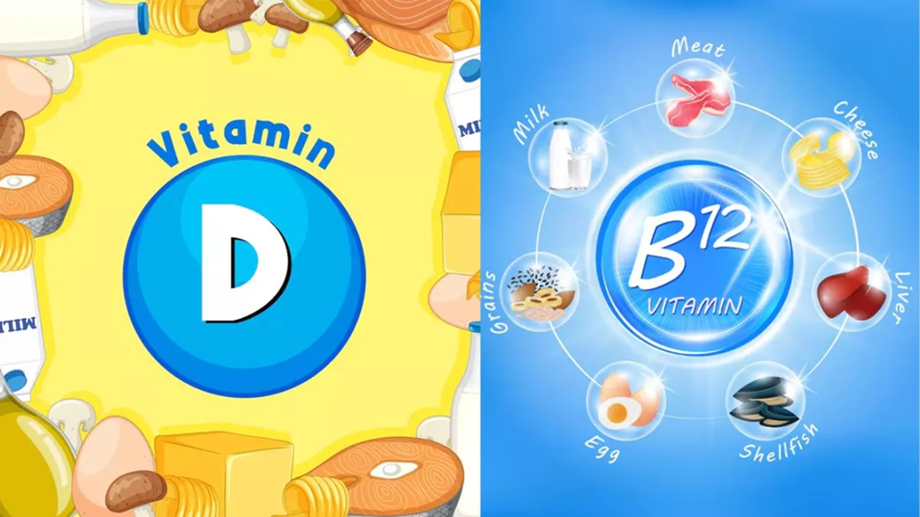
Vitamin D3 & Vitamin B12 – Why They Are Essential for Indians
Category: Trending |
Date: August 17, 2025
Introduction
In today’s fast-paced lifestyle, nutritional deficiencies are becoming increasingly common in India. Among the most concerning are Vitamin D3 deficiency and Vitamin B12 deficiency. Both play a vital role in overall health, yet millions of Indians remain unaware of their importance. According to recent studies, over 70% of Indians are deficient in Vitamin D3, while nearly 47% suffer from low Vitamin B12 levels.
This blog will help you understand why Vitamin D3 and B12 are essential, their benefits, deficiency symptoms, natural food sources, supplements, and the best ways for Indians to maintain healthy levels.
Why Vitamin D3 is Important for Indians
What is Vitamin D3?
Vitamin D3, also known as cholecalciferol, is a fat-soluble vitamin that the body produces when the skin is exposed to sunlight. It is often called the “sunshine vitamin” because of this unique ability.
Health Benefits of Vitamin D3
Bone & Joint Health – Helps in calcium absorption, strengthens bones, and prevents osteoporosis.
Immunity Booster – Plays a major role in fighting infections, including respiratory illnesses.
Mood & Mental Health – Regulates serotonin levels and reduces risks of depression.
Heart Health – Supports cardiovascular function and lowers risk of hypertension.
Why Indians are Deficient in Vitamin D3
Despite living in a sunny country, a large percentage of Indians are Vitamin D3 deficient due to:
Indoor lifestyle and less exposure to sunlight.
Use of sunscreen blocking UVB rays.
Dark skin tone, which reduces vitamin D synthesis.
Vegetarian diets with limited Vitamin D sources.
Why Vitamin B12 is Important for Indians
What is Vitamin B12?
Vitamin B12, also known as cobalamin, is a water-soluble vitamin essential for the production of red blood cells, nerve health, and DNA synthesis.
Health Benefits of Vitamin B12
Prevents Anemia – Increases red blood cell production and prevents fatigue.
Supports Brain Function – Improves memory, focus, and mood.
Boosts Energy Levels – Converts food into usable energy.
Healthy Pregnancy – Essential for fetal brain and nervous system development.
Why Indians are Deficient in Vitamin B12
Vegetarian diet – Vitamin B12 is mainly found in animal products.
Low awareness – Lack of knowledge about supplementation.
Poor absorption – Conditions like gastritis or excessive use of antacids can reduce absorption.
Vitamin D3 & B12 Deficiency Symptoms
Common Symptoms of Vitamin D3 Deficiency
Weak bones, frequent fractures, or osteoporosis.
Fatigue and low immunity.
Muscle pain and weakness.
Mood swings and depression.
Common Symptoms of Vitamin B12 Deficiency
Constant tiredness and weakness.
Numbness, tingling in hands/feet (nerve damage).
Memory issues and poor concentration.
Pale skin and shortness of breath.
Best Food Sources for Vitamin D3 & B12
Vitamin D3 Rich Foods
Fatty fish (salmon, mackerel, sardines).
Egg yolks.
Fortified milk and cereals.
Mushrooms exposed to sunlight.
Vitamin B12 Rich Foods
Dairy products (milk, paneer, curd, cheese).
Eggs.
Fish and chicken.
Fortified plant-based milks (soy, almond, oat).
(Tip: Vegans can rely on fortified foods or Vitamin B12 supplements.)
Vitamin D3 & B12 Supplements for Indians
Since food sources alone may not be enough, many Indians rely on supplements.
Vitamin D3 supplements – Available in soft gels, capsules, chewable tablets, and drops (commonly in 60,000 IU weekly doses).
Vitamin B12 supplements – Available in tablets, injections, and sublingual forms.
Combination supplements – Some multivitamins combine Vitamin D3 and B12 along with other essential nutrients.
⚠️ Always consult a doctor or pharmacist before starting supplements.
Sunlight & Lifestyle Tips for Indians
Get 20–30 minutes of morning sunlight at least 4 times a week.
Include fortified foods in your diet.
Exercise outdoors for better exposure.
Avoid excessive processed foods that can worsen nutrient absorption.
FAQs on Vitamin D3 & B12 for Indians
1. How much Vitamin D3 do Indians need daily?
The recommended daily allowance is 600–800 IU, but doctors often prescribe higher doses (e.g., 60,000 IU weekly) in deficiency cases.
2. How much Vitamin B12 should I take daily?
Adults need about 2.4 mcg daily, but deficiency may require higher doses.
3. Can vegetarians get enough Vitamin B12 naturally?
No, since B12 is mostly found in animal foods. Vegetarians must consume fortified foods or supplements.
4. Can Vitamin D3 and B12 be taken together?
Yes, they are often prescribed together as they complement each other in supporting energy, immunity, and bone health.
5. Which age group in India is most at risk?
Office workers with limited sunlight exposure.
Elderly people.
Pregnant women.
Vegetarians & vegans.
Conclusion
Deficiency of Vitamin D3 and Vitamin B12 is one of the most ignored health issues in India, yet it directly impacts energy, immunity, mental health, and overall well-being. With a balanced approach of sunlight exposure, nutrient-rich foods, and supplements when required, Indians can easily prevent these deficiencies and lead healthier lives.
If you’re experiencing symptoms like constant fatigue, bone pain, or weakness, it’s time to get your Vitamin D3 and B12 levels tested and consult a healthcare provider.
👉 At Intros Care Pharmacy, we provide Vitamin D3 & B12 supplements, professional consultation, and lab test bookings to help you stay healthy.
